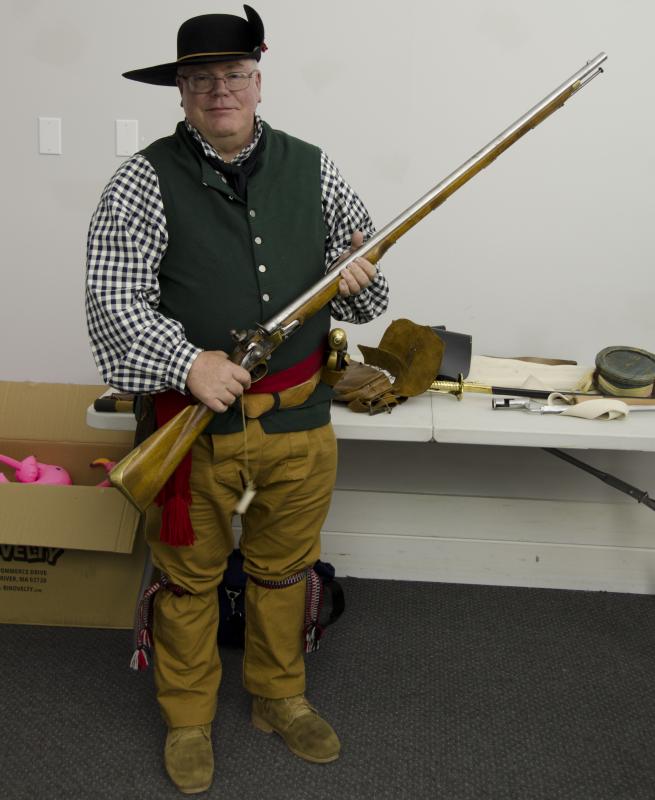'Redcoats and Residents': Militiaman recounts the British attack on Wareham
The battles of the War of 1812 spanned the Great Lakes to the mouth of the Mississippi River. And on June 13, 1814, Wareham had its own part in the drama, even if it only lasted two hours.
“According to some stories, the British burned the whole town,” Malcolm Phinney told a group gathered at the Wareham Library on Tuesday evening.
Phinney’s presentation, “Redcoats and Residents,” outlined the War of 1812 and was the first event of the Wareham Summer of Celebration 2014.
The Captain of the Wareham Minutemen and Militia Companies, Phinney is well versed in the role of militia. He said every town was required to have militia in the early days of the United States.
Wareham’s contingent, however, was nothing akin to an army. When 220 redcoats from the HMS Nimrod rowed into the harbor hoping to capture hidden boats used by the military, there were a mere 12 militia in town.
The town, with a population of 500 to 700, had received some advance warning of the invasion from a man named Ebenezer Bourne who found the fearless militia at a tavern.
The 12 quickly rallied and sent a reverend to get the gunpowder and shot from Selectmen, who kept it in their possession. Meanwhile, women and children were sent to West Wareham for safety.
According to Phinney, it had taken a while for the British to involve New England in the fighting. As a hub of commerce and trade, they hoped to maintain ties with the region.
The War of 1812 broke out only a few decades after America defeated the mother country in the Revolutionary War and not everyone (especially the British) was convinced that the U.S. could survive on its own.
But former President Thomas Jefferson was fed up with the British. There were several territories claimed by both the U.S. and England as well as the prime territory at the mouth of the Mississippi River. The British Navy also had a way of dominating the seas. Jefferson asked Congress to declare war on Great Britain, which it did on June19.
New England, in particular, was opposed it.
“We were trying to stay out of sight, out of mind, but it wasn’t to be,” said Phinney.
After the war began, the U.S. had established its own navy to fight against the British, who had the largest navy on earth at the time. They had won important battles by the time the soldiers of the HMS Nimrod set their focus on Buzzards Bay.
And after launching more than 300 shells at Falmouth, Wareham Selectmen were waving a white flag when the redcoats arrived at what is now called British Landing.
The militiamen hid their weapons under a house on Main Street and Selectmen played nice.
All seemed to be going well until British officer took Wareham resident Barker Crocker's horse for himself. Before handing over the horse, Crocker put a burr in the saddle. When the officer mounted the steed, he was thrown off in short order.
“The crowd pointed and cheered,” Phinney said.
The embarrassed officer then decided to get revenge. Soldiers set fire to a cotton factory near the present day Tremont Nail Factory and kidnapped 12 people, vowing to kill them if the Wareham militia retaliated.
A Washington D.C. newspaper soon after reported the destruction by fire of Wareham, but reports of the town’s demise were greatly exaggerated.
“The factory was back in operation two days later. A house on Main Street that was set on fire was extinguished,” Phinney said.
Eight ships were set on fires as well, but most of those were also put out.
After extensive research, Phinney has come to the conclusion that there wasn’t a real confrontation between the militia and soldiers.
“I don’t believe there was actually any gunfire exchanged,” he said.
And the 12 men held hostage?
“They were left on Cromesett Point and had to walk home,” Phinney said.
The British never returned, though soon after they set fire to the White House. The act enraged Americans and rallied the country around the war.
“It really boosted the spirits of all Americans, and we started to become a united nation,” said Phinney.
The battles of Fort McHenry and Plattsburg followed and on December 24, 1814 the Treaty of Ghent was signed in England, ending the war.
Of course, the news traveled slowly and battles continued for weeks if not longer.
On January 6, 1815, Andrew Jackson, some Kentucky riflemen and Tennessee mountain boys charged the British in the Battle of New Orleans, securing the opening of the Mississippi River as well as opening up the Western territories.
The battle, said Phinney, was considered the last one of the war, but fighting still isn’t over in Wareham. On June 15, the Wareham Militia and Minutemen along with a host of other organizations will re-enact the “attack on Wareham” as part of the 200-year anniversary of the British soldiers’ arrival. For more information and a complete list of events, visit http://wareham2014.com.

















